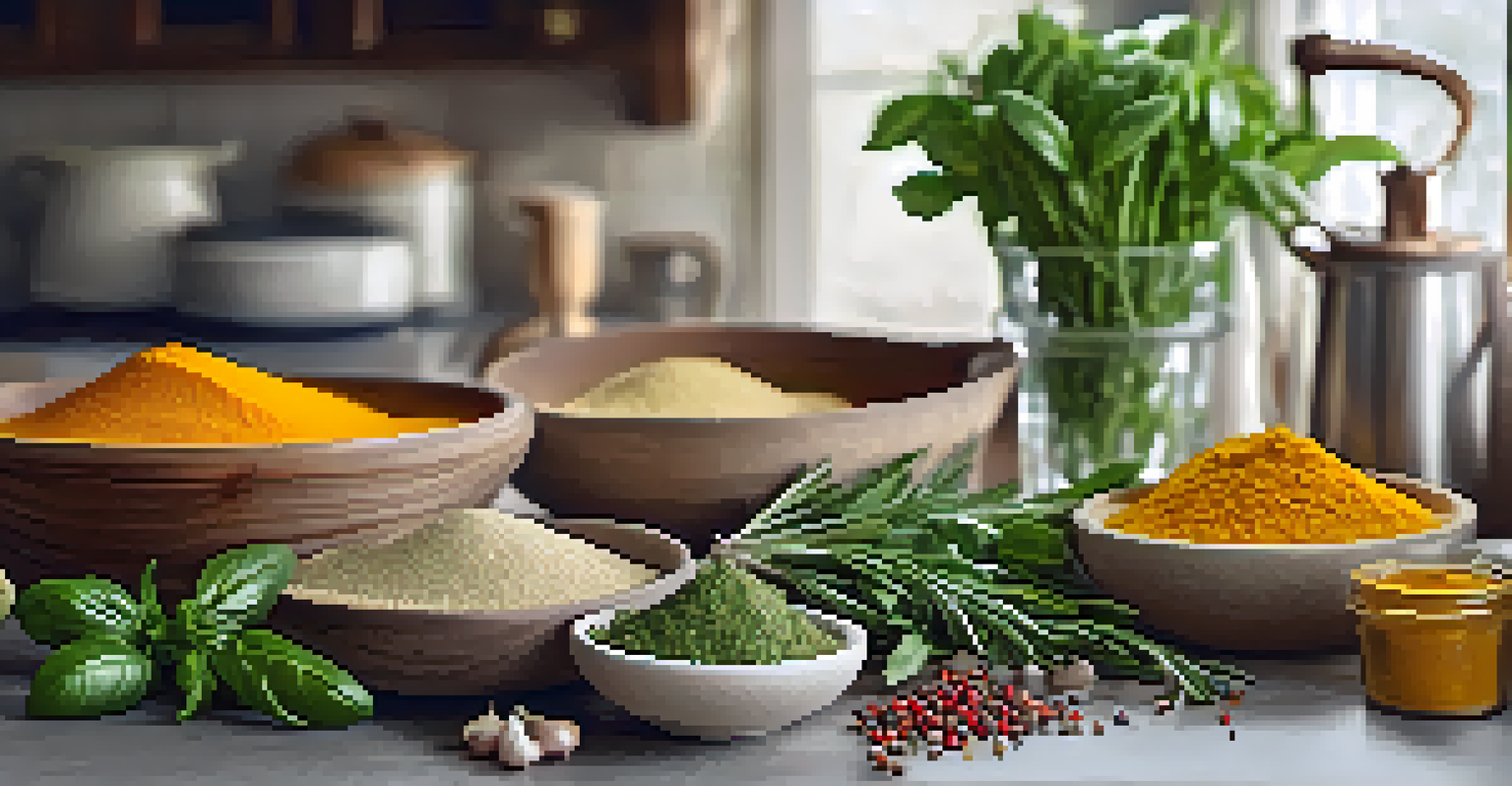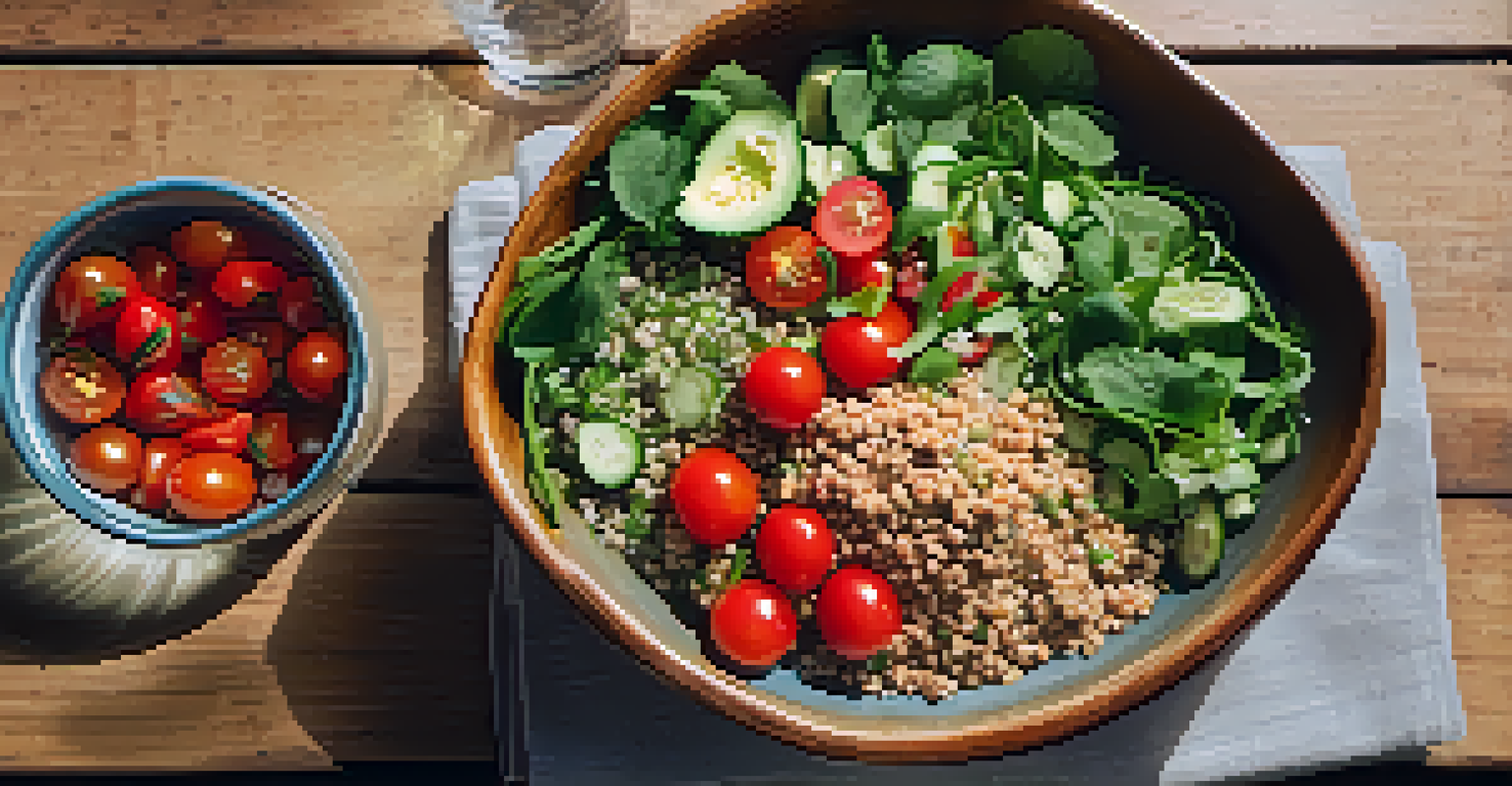Boost Your Immune System With Plant-Based Nutrition Choices

Understanding the Immune System and Its Importance
The immune system is your body's defense mechanism, crucial for protecting against infections and diseases. It comprises various cells, tissues, and organs working together to identify and eliminate invaders like bacteria and viruses. A strong immune system can help you recover faster from illnesses and maintain overall health.
The greatest medicine of all is to teach people how not to need it.
When your immune system is functioning optimally, you might notice fewer colds or infections, which can dramatically improve your quality of life. It's not just about fighting off illness; a robust immune system also plays a role in preventing chronic diseases and managing stress. Thus, taking care of your immune system should be a priority.
One of the most effective ways to support your immune health is through your diet. Plant-based nutrition is packed with vitamins, minerals, and antioxidants that can give your immune system the boost it needs to fend off illness effectively.
The Role of Antioxidants in Strengthening Immunity
Antioxidants are compounds found in many plant foods that help neutralize free radicals in the body. Free radicals can cause oxidative stress, leading to cellular damage and a weakened immune response. By consuming foods rich in antioxidants, you can protect your body from this damage and keep your immune system strong.

Fruits and vegetables are some of the best sources of antioxidants. For example, berries, spinach, and nuts are not only delicious but also provide a powerhouse of nutrients that contribute to better immunity. Incorporating a variety of colorful produce into your meals can ensure you're getting a broad spectrum of these beneficial compounds.
Boost Immunity with Nutrition
A diet rich in plant-based foods, antioxidants, and essential vitamins can significantly enhance your immune system.
Additionally, antioxidants help reduce inflammation, another critical factor in maintaining a healthy immune response. When inflammation is kept in check, your body can focus its energy on fighting off pathogens rather than dealing with chronic inflammation.
Essential Vitamins and Minerals for Immune Health
Certain vitamins and minerals play pivotal roles in supporting immune function. For instance, vitamin C, found in citrus fruits and bell peppers, is known for its ability to enhance the production of white blood cells, which are vital for fighting infections. Similarly, zinc, found in legumes, seeds, and whole grains, is essential for immune cell development.
Let food be thy medicine and medicine be thy food.
Vitamin D is another crucial nutrient that often gets overlooked. It's primarily obtained through sunlight exposure, but you can also find it in fortified plant-based foods and mushrooms. Adequate levels of vitamin D can improve your immune response and reduce the risk of respiratory infections.
Lastly, don’t forget about vitamin E, which acts as an antioxidant and can be found in nuts, seeds, and green leafy vegetables. Together, these nutrients create a powerful defense against pathogens and keep your immune system functioning at its best.
The Benefits of Fiber for Immune Support
Fiber is often associated with digestive health, but it also plays a significant role in immune function. A diet high in fiber helps maintain a healthy gut microbiome, which is crucial for a well-functioning immune system. A balanced gut flora can enhance your immune response and reduce inflammation.
Foods rich in fiber include whole grains, legumes, fruits, and vegetables. Incorporating a variety of these foods into your diet can create a thriving gut environment. Think of your gut as a garden; the more diverse and healthy the plants, the better the garden flourishes.
Hydration Supports Immune Health
Staying hydrated is crucial for optimal immune function, helping to transport nutrients and flush out toxins.
Moreover, soluble fiber can help regulate immune responses, ensuring that your body reacts appropriately to threats. So, if you want to fortify your immune system, don't forget to load up on fiber-rich foods!
Hydration: The Often Overlooked Immune Booster
Staying hydrated is fundamental to maintaining a healthy immune system. Water helps transport nutrients to cells and flush out toxins from the body. When you're well-hydrated, your body can function optimally, including its immune responses.
Many plant-based foods, such as fruits and vegetables, have high water content and can contribute to your overall hydration. For example, cucumbers, watermelon, and oranges not only hydrate you but also provide essential vitamins and minerals. Incorporating these foods into your diet can make hydration easy and enjoyable.
Additionally, dehydration can lead to a weakened immune response, making you more susceptible to infections. So, keep your water bottle handy and consider hydrating foods as part of your daily nutrition for optimal immune support.
Herbs and Spices That Enhance Immunity
Incorporating herbs and spices into your meals can be a flavorful way to boost your immune system. Many herbs, such as garlic, ginger, and turmeric, have anti-inflammatory and antioxidant properties that support immune health. For instance, garlic is known for its ability to enhance the function of immune cells.
Turmeric, with its active compound curcumin, is another powerful ally in fighting inflammation and supporting immune function. Adding turmeric to your dishes not only adds a warm flavor but also helps your body combat illness naturally.
Herbs and Spices for Immune Boost
Incorporating herbs like garlic and turmeric into your meals can provide anti-inflammatory and antioxidant benefits that support immunity.
Don’t overlook the potential of other herbs like echinacea and astragalus, which are often used in traditional medicine to bolster immune defenses. A dash of these herbs can elevate both the flavor and health benefits of your meals.
Practical Tips for Adopting Plant-Based Nutrition
Transitioning to a plant-based diet can be simple and rewarding. Start by incorporating more fruits and vegetables into your meals, aiming for a variety of colors and types. Experiment with new recipes that feature legumes, whole grains, and plant-based proteins to keep your meals exciting.
Consider meal prepping to make plant-based eating more convenient. By preparing meals in advance, you'll have healthy options on hand, reducing the temptation to reach for less nutritious choices. Plus, it can save you time during busy weekdays.

Lastly, don't hesitate to seek out plant-based alternatives to your favorite foods. There are countless options available now, from dairy-free yogurts to meat substitutes. Finding satisfying replacements can make your transition easier and more enjoyable.